Felipe A. Cini (Luke Remage-Healy's Lab)
Grid cells activity in a homing task requiring path integration
Jingjie Peng (Kevin Allen's Lab / Hannah Monyer's Lab)
Department of Clinical Neurobiology at the University of Heidelberg and German Cancer Research Center, Germany
In my project, we use Cambridge Neurotech probes to track the activity of grid cells in the medial entorhinal cortex. By recording several grid cells simultaneously, we were able to reconstruct a mouse's movement path from the grid cells' activity. We found that the grid coordinate system changes its anchoring point during single trials of a navigation task.
Converging evidence from experiments in both rodents and humans suggests that grid cells contribute to path-integration-dependent navigation. How grid cell activity might contribute to path-integration-dependent behavior has remained to be determined as grid cell activity has been studied mostly during random foraging or other behavioral paradigms with limited navigational demands. Here we recorded grid cell activity in freely moving mice performing a path integration task (AutoPI task) in which the mouse searched for a lever on an arena and returned to the home base to collect a reward. Surprisingly, grid cells did not have a stable periodic firing pattern during the task. Using a combination of single-cell analysis and grid-module-level decoding techniques, we found that error accumulated in the phase and orientation of the grid representation when mice navigated in darkness. Moreover, we often observed a translation of the grid pattern within trials, whereby the grid representation went from being anchored to the room reference frame to being anchored to a task-relevant, moving object. Despite this re-anchoring which caused discontinuity in integration of self-motion information by grid cells, we found that error accumulation in the orientation of the grid cell pattern predicted the homing direction of the mouse. Our findings provide novel insights into the function of grid cells in path-integration-dependent behavior.




